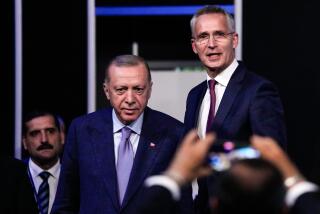Genocide bill spurs Turkish envoy’s recall
- Share via
WASHINGTON — Turkey recalled its ambassador to Washington on Thursday and denounced as “unacceptable” a congressional panel’s vote declaring the early 20th century slaughter of Armenians by Ottoman Turks a genocide.
Even as the Bush administration scrambled to try to stem the diplomatic fallout, Turkish President Abdullah Gul castigated the House Foreign Affairs Committee on Thursday for its 27-21 vote, saying the decision “has no validity and is not worthy of the respect of the Turkish people.”
The withdrawal of Ambassador Nabi Sensoy, coming only hours after the committee vote Wednesday, was a clear signal of Turkish disapproval and is widely expected to be followed by retaliatory steps after weeks of threats that House action would have serious consequences.
Turkey is likely to calibrate its response, Turkish officials and independent analysts said. The government in Ankara could start with relatively mild moves and ratchet them up if the full House votes to adopt the nonbinding resolution later this year, as is expected. One early step may be for the Turkish parliament to authorize its military to cross into Iraq in pursuit of Kurdish extremists. Turkish Prime Minister Recep Tayyip Erdogan has said he will request that authorization, which could come next week.
The Turkish Foreign Ministry summoned U.S. Ambassador Ross Wilson to express the government’s displeasure, and the head of Turkey’s navy canceled a planned trip to Washington.
The Turkish military is set to cut back some routine contacts with U.S. military officials, analysts said. More serious steps may include reducing U.S. military access to crucial air and ground conduits through Turkey into the war theaters in Iraq and Afghanistan. Turkey also may decide to recall some of its approximately 1,000 troops in Afghanistan and could bow out of U.S.-led efforts to counter Iran’s nuclear program.
Rep. Mike Pence (R-Ind.), who voted against the resolution, called the ambassador’s recall “ominous but predictable” and warned that it “could foreshadow more serious diplomatic consequences.”
But House Speaker Nancy Pelosi (D-San Francisco) predicted that the U.S.-Turkish resolution would remain strong. She said she expected the resolution to be brought to a House vote before the current session adjourns Nov. 16.
Secretary of State Condoleezza Rice called Gul and Erdogan to try to calm the diplomatic uproar.
The congressional debate stirs deep emotions in modern Turkey, as it does among Armenian Americans, who have spearheaded the drive for the resolution. Several Turkish television and radio stations covered the U.S. debate for days before the committee vote.
As many as 1.5 million Armenians were killed by Turks beginning in 1915 as part of a campaign to drive them from eastern Turkey. Turks acknowledge that hundreds of thousands of Armenians died, but contend that it was not a systematic government effort but the result of World War I and the disorder that came with the collapse of the Ottoman Empire.
The genocide resolution has amplified the unhappiness of Turks, who already were upset over the U.S.-led invasion of Iraq in 2003 and what they see as the Americans’ unwillingness to rein in the main Turkish Kurd militant group, the Kurdistan Workers Party, or PKK, which has launched cross-border attacks from U.S.-controlled northern Iraq. Turks have been especially angry in the last two weeks as deadly PKK attacks have escalated. Many Turkish political leaders have given up on hopes that the U.S. might restrain the PKK.
This week’s announcement of the resignation of retired Gen. Joseph W. Ralston, an American envoy charged with working with Turkish authorities to counter the PKK, was seen by Turks as more proof of the ineffectiveness of U.S. diplomacy.
Mark Parris, U.S. ambassador to Turkey during the Clinton administration, said a Turkish official warned him after the vote: “We’re going to start reacting. You’ll see.”
Bulent Aliriza, director of the Turkey Project at the Center for Strategic and International Studies in Washington, said Turkish anger at the genocide resolution combined with the escalation of PKK attacks had “severely reduced” U.S. leverage against Turkish intervention in northern Iraq.
Turkish disapproval of U.S. policies was prevalent before the congressional committee vote. In a poll this year by the Pew Research Center, only 9% of Turks viewed the U.S. favorably.
Even Milliyet, among the most pro-American newspapers in Turkey, ran a front-page editorial Thursday calling for retaliation, noted Soner Cagaptay, director of the Turkey program at the Washington Institute for Near East Policy. “That tells you how serious these sentiments are,” Cagaptay said.
--
Special correspondent Yesim Borg in Istanbul, Turkey, and Times staff writer Richard Simon in Washington contributed to this report.
More to Read
Sign up for Essential California
The most important California stories and recommendations in your inbox every morning.
You may occasionally receive promotional content from the Los Angeles Times.














